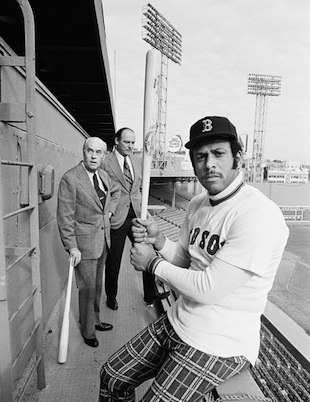 On January 11, 1973, baseball owners agreed to the most significant change in baseball's history by allowing the American League to experiment for three years with a "designated pinch-hitter." The decision to try this in the AL was made after eight of the 12 teams reported losing money and gave managers the option of using this batting replacement for the pitcher. Oakland's Charlie Finley led the charge for the three-year trial with the DH being approved by an 8-4 vote of American League owners.
On January 11, 1973, baseball owners agreed to the most significant change in baseball's history by allowing the American League to experiment for three years with a "designated pinch-hitter." The decision to try this in the AL was made after eight of the 12 teams reported losing money and gave managers the option of using this batting replacement for the pitcher. Oakland's Charlie Finley led the charge for the three-year trial with the DH being approved by an 8-4 vote of American League owners.
The decision to try this was following the experiment in the International League in 1969 when batting averages rose 10 percent, scoring increased six percent and games took six minutes left to play because of fewer replacements of pitchers.
Bowie Kuhn, the commissioner who makes you appreciate Bud Selig, broke the stalemate between the two leagues and said, "I hope it works. I would have preferred that both leagues did it. But if it's successful in one, then I hope the National League follows suit."
At this same meeting, there was discussion regarding interleague play and was turned over to a study committee with expectation that it would be enacted in 1974.
By January 13, there were reactions everywhere to this new rule. Stan Musial was asked if he might consider a comeback at age 52.
"I could still hit, but I don't know who'd do the running," Musial replied.
Mickey Mantle, who had retired three years before at agee 38, said, "It's not for me. That's why I quit — because I couldn't hit anymore. Every time I'd take a stride at the plate, my knee would almost go out on me."
Casey Stengel, the 82-year old former manager, said, "It will give jobs to a lot of men who are elderly and slow. They don't hit .400 today and the pitchers even expectorate on the ball."
Tom Seaver, who won 21 games in 1972 and hit three homers, said, "I think fans appreciate the total athlete more than the owners give them credit for. Part of the game is being a total athlete, doing more than one thing."
Mickey Lolich, who pitched 327 innings in 1972 for the Tigers, said, "I'll be able to stay strong during the game because I won't have to run the bases and I can rest between innings. I pitch a lot of innings, and I think the little extra rest is going to help me."
Billy Williams, the 34-year Cubs outfielder, said, "Something like this could add 10 or 12 years to my career." (Williams played until he was 38, serving as Oakland's designated hitter for the final two seasons of his career.)
On January 18, Orlando Cepeda became the first "name" player to sign with a team to be their DH. The 35-year-old Cepeda chose the Red Sox despite offers from the White Sox and the Rangers. When asked why Boston, Cha-Cha responded, "Ted Williams. I always liked Ted Williams."
By January 21 1973, the Times first started printing letters to the editor in response to the rule change. One writer described it as the "first step to doom" akin to football having offensive and defensive teams. The reader anticipated that by the year 2000, baseball would have designated runners, hitters, and fielders.
The following week one reader chimed in writing that the DH is "a reflection of the spreading desire among Americans for quick action and easy results that lead in part to consequences both diverse and self-destructive such as the current "epidemic" of drug abuse and environmental pollution."
Forty years later, the debate continues. Well, not whether the DH leads to environmental pollution, but its role in the game and whether or not the NL should get around to adopting it as year-round interleague play begins.
I close with a quote from Arthur Daley, one of the premier sports columnists of his time. On February 4, 1973 he wrote a marvelously entertaining column about the number of players who dropped out of the majors because despite their ability to hit, were simply horrible fielders.
He closed the column by stating something that has so far proven correct for Edgar Martinez and will most likely will be true for David Ortiz; Daley wrote, "But the ones who are exalted figures in the Hall of Fame are the ones who could do it all. It's a cinch that no designated hitter will ever make it to Cooperstown."
Bill Chuck runs Billy-Ball.com. Follow him on Facebook and Twitter.
No comments:
Post a Comment